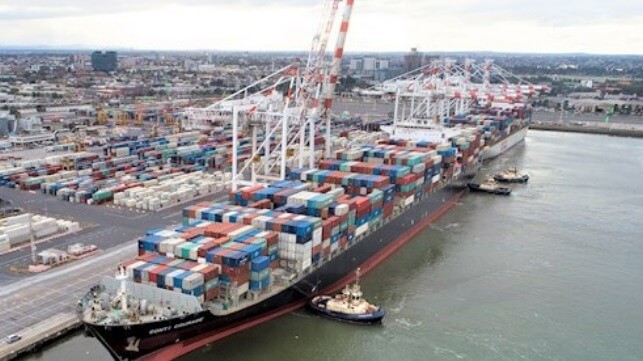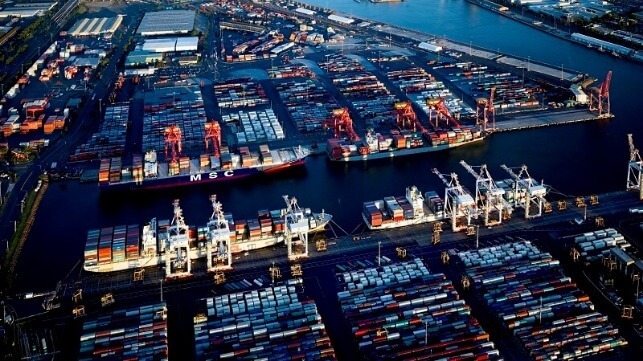Australia Port Strike Deadlock Continues as Government Says No Intervention

Hopes that the Australian government would help to break the deadlock in the wage negotiations for terminal operator DP World were dashed on Thursday after Australia’s Workplace Relations Minister met with the company and Maritime Union of Australia. Hosting a press conference later in the day, Minister Tony Burke had harsh words for DP World and said both sides needed to negotiate to get a deal done.
“I have made it clear to both groups that I have no intention of intervening,” Burke told reporters after meeting separately with DP World and the MUA. He seemed to turn against DP World taking up the themes expressed by the unions while ignoring the pleas of businesses and shippers that have said the rolling strikes which have been ongoing since October are causing harm to the economy and their operations. Burke did not agree with the estimates of the damage to the economy saying the company and union need to reach terms through negotiations.
The union is standing firm on its demand for a 16 percent pay increase for its approximately 1,500 members who staff DP World’s terminals in Sydney, Brisbane, Melbourne, and Fremantle. Estimates are that the company handles about 40 percent of the container volumes in Australia rivaling the slightly larger Patrick terminals.
Under Australian labor law, Burke could compel the companies into arbitration with the “Fair Work Ombudsman” from the labor commission to arbitrate the dispute. The minister is given the authority if he believes that the strike is causing significant harm to the economy. Burke stopped short today saying instead they needed to negotiate and the Fair Work Commission could aid in finding a resolution. Last year, the Fair Work Commission compelled Svitzer and its unions to reach a tentative agreement to a multi-year contract dispute with the threat of arbitration if they did not come to terms. Burke said he told both sides he expected that they would reach an agreement.
Businesses across Australia are complaining about disruptions with the major carriers reporting significant delays or omitting scheduled port calls because of the rolling work stoppages. Last week, the Fair Work Commission sided with the MUA authorizing more strikes but the union backed away from a plan for eight-hour stoppages this week in favor of two-hour intervals along with continuing bans on overtime or extra shifts.
The Australian Retailers Association is predicting worsening problems as the contract impasse drags on. By the trade group’s estimates, as many as 48,000 containers are currently stranded with the retailers saying shipping delays range between two and eight weeks.
Burke speaking after his meetings said he believes the Australian consumer is “sick to death” of hearing companies say wages are the problem. He said if DP World “had invested as much into the negotiations as they have into their media campaign, they might already have an agreement.”
Late on Thursday, the Maritime Union of Australia reportedly filed a notice informing the Fair Work Commission and the company of its intention to extend the current job actions at least till the end of January.
The opposition government has joined with industry in saying the government of Prime Minister Anthony Albanese needs to get involved to settle the dispute.
Australian Minister to Meet DP World and MUA Over Long Contract Dispute

Disruptions and backlogs are continuing to mount at Australia’s four primary container ports as the dispute between DP World and the Maritime Union of Australia remains deadlocked after 10 months of negotiations. In the latest steps, Australia’s Employment and Workplace Relations Minister Tony Burke asked to meet with both sides to see if the deadlock can be broken and a new contract reached for workers at DP World’s terminals in Sydney, Brisbane, Melbourne, and Fremantle.
Pressure has been mounting on the government to take action after last week’s decision by the labor regulators that approved new rounds of strikes by the union members despite the threat of widespread disruptions at the ports. The contract expired in October 2023 and since then the union has been staging waves of rolling strikes, work stoppages, and steps such as declining overtime at the terminals which collectively handle about 40 percent of the container volume in Australia.
The Maritime Union of Australia is demanding a 16 percent pay increase and appeared to win some indirect support from Australian Prime Minister Anthony Albanese. Speaking in radio interviews the prime minister called for a “mutually beneficial outcome,” saying it was fair for the dockworkers to expect to benefit from the strong profits of DP World.
“I think that the company and the union should sit down in good faith and sort this out,” Albanese said on Newcastle radio station 2HD this morning. Shortly after his appearance word leaked confirmed by both the company and the union that their representatives accepted an invitation for meetings on Thursday with Tony Burke.
The union has repeatedly urged the government to stay out of the negotiations, supported by trade groups such as the Australia Council of Trade Unions. Opposition government members over the weekend however said the disruptions had gone on long enough and it was time for the Albanese government to use its authority to end the dispute. The government can compel both sides toward a settlement similar to the steps taken by the Fair Work Commission last year to get a tentative agreement in the long-running dispute between tugboat operator Svitzer and its unions. They can also start an arbitration process through the Fair Work Commission.
Last week, the Fair Work Commission sided with the MUA permitting it to launch a new range of job actions with five days’ notice. The union had said it would stop work for up to eight hours a day at the four ports this week and ban overtime, but over the weekend retreated to a plan of two-hour stoppages several times in the day as well as other work bans. The actions are scheduled to continue till January 24.
Business leaders and groups as well as companies such as retailers are pushing for the government to end the disruptions. Estimates are that it is costing the Australian economy more than US$50 million a week. Economists are also raising concerns about the disruptions spurring inflation due to shortages and delays in the supply chain.
Maersk for example has repeatedly warned shippers to expect delays and reported rerouting containers between the four ports. In its latest advisory issued to customers on January 15, the company reports that four ships due to arrive in Australia would be limiting their calls to a single port. Two of the ships will call in Sydney and two in Brisbane with an elaborate plan to swap boxes to limit the disruptions to customers. Maersk also recently scheduled an extra loader to supplement the schedule and clear backlogs only to be forced to limit its port calls due to the rolling job actions.
No comments:
Post a Comment